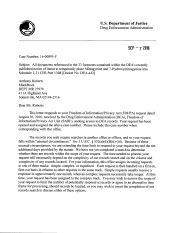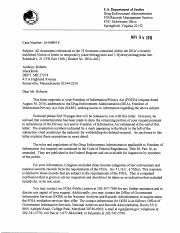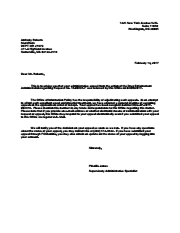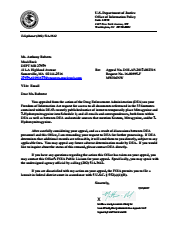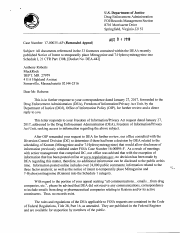DEA: Kratom, Mitragynine, and 7-Hydroxymitragynine Schedule 1 Documents
| Tracking # |
17-00035-F 16-00895-F, DOJ-AP-2017-002316 |
| Submitted | Aug. 30, 2016 |
MuckRock users can file, duplicate, track, and share public records requests like this one. Learn more.
Communications
From: anthony roberts
To Whom It May Concern:
This is a request under the Freedom of Information Act. I hereby request the following records:
I am seeking copies of all documents referenced in the 33 footnotes contained within the DEA's recently published notice of intent to temporarily place Mitragynine and 7-Hydroxymitragynine into Schedule I, listed here:
21 CFR Part 1308
[Docket No. DEA-442]
Schedules of Controlled Substances:Temporary Placement ofMitragynine and 7-Hydroxymitragynine into Schedule I
https://www.federalregister.gov/articles/2016/08/31/2016-20803/schedules-of-controlled-substances-temporary-placement-of-mitragynine-and-7-hydroxymitragynine-into
In addition, I am seeking all emails and correspondances, both from within the DEA as well as between the DEA and outside sources (especially communications to and from pharmaceutical companies, pharmaceutical trade groups, and pharmaceutical lobbying groups, or their representitives), that mention Kratom, Mitragynine, and/or 7-Hydroxymitragynine.
The requested documents will be made available to the general public, and this request is not being made for commercial purposes. I am a professional member of the media, and ask that any fees resulting from this request be waived.
In the event that there are fees, I would be grateful if you would inform me of the total charges in advance of fulfilling my request. I would prefer the request filled electronically, by e-mail attachment if available or CD-ROM if not.
Thank you in advance for your anticipated cooperation in this matter. I look forward to receiving your response to this request within 20 business days, as the statute requires.
Sincerely,
anthony roberts
From: Drug Enforcement Administration
An interim response, stating the request is being processed.
From: MuckRock.com
To Whom It May Concern:
I wanted to follow up on the following Freedom of Information request, copied below, and originally submitted on Aug. 30, 2016. Please let me know when I can expect to receive a response, or if further clarification is needed. You had assigned it reference number #16-00895-F.
Thanks for your help, and let me know if further clarification is needed.
From: Drug Enforcement Administration
A copy of documents responsive to the request.
From: anthony roberts
Freedom of Information Act Appeal
January 23, 2017
This correspondence shall serve as my appeal in the matter of Freedom of Information Act Case Number: 16-00895-F, which I filed with the Drug Enforcement Administration on 8/30/2016, resulting in a response date of November 4th, 2016. In that response, I was informed that an appeal must be filed within 90 days. Accordingly, this appeal has been filed in a timely manner.
My FOIA request asked for 34 distinct items - the 33 footnotes referenced by the DEA in their Notice of Intent to Emergency Schedule the major alkaloids of kratom: mitragynine, and 7-hydroxymitragynine. In addition, I requested a copy of communications on kratom between the DEA and outside sources (especially communications to and from pharmaceutical companies, pharmaceutical trade groups, and pharmaceutical lobbying groups or their representatives). The aforementioned Notice of Intent was closed to public comment and was to take effect the following month.
Unbelievably, despite citing these 33 footnotes (33/34ths of my request) the very same day I filed my request, the DEA responded with the claim that additional time was necessary to locate the requested records, the process precipitated "unusual circumstances."
From my experience, it seems unusual that a document filed with 33 footnotes cited would prompt a reply that several weeks would be required to locate those footnotes.
After the August 30th notice was posted, an online petition quickly reached over a hundred thousand signatures. The DEA responded by withdrawing the Notice of Intent as of October 13th, and opening the comment period. However, despite these actions, they still failed to provide the general public with many of the footnotes they referenced, and failed to provide them to me pursuant to my request. This appeal asks the DEA to recognize that the Freedom of Information statute commits our federal agencies to "...the principle that a democracy cannot function unless the people are permitted to know what their government is up to..."[Favish v. OIC,(9th. Cir., July 12, 2000)].
Ultimately, on November 4th, the DEA provided 42 pages of documents. The first three pages were a written response to the FOIA request itself, and a list of exemptions for the bulk of the request without accompanying citations to which specific parts of the 34-part request each individual exemption applied. The next six pages were previously-available legislative documents from the 1980s and '90s. Eleven pages were a chapter from a book on kratom that was available online. Thirteen pages were a copy of Ireland's Misuse of Drugs Act. The remainder were online press releases from the FDA. While my knowledge of Ireland's drug policy was admittedly limited prior to the completion of this FOIA request, it bears noting that this information was also available online and free of charge (although I had not availed myself of its wisdom beforehand). It is therefore impossible to evaluate the merits of each denial, and respond appropriately.
Thus, when the DEA finally completed processing my request, both denying it in part and granting it in part, they provided nothing substantive that might have further informed the public about the pending regulation. This defies the tenet that an "...informed public is desirable, that access to information prevents governmental abuse and helps secure freedom, and that, ultimately, government must answer to its citizens..." [Pansy v. Borough of Stroudsburg, 23 F.3d 772, 792 (3rd Cir. 1994)].
For that reason this appeal should also serve as a request, should I not be granted access to the withheld documents, for the DEA to annotate specifically how each exemption applies to the 34 requested documents (minus the ones that were granted), so they can be addressed on their own merits. The DEA did not articulate their denials with the necessary precision to be addressed soundly on appeal, nor did they describe the documents being withheld – some of which appear to comprise numerous documents that span multiple years and countries, despite being designated the same footnote. For example, reference 33 mentions a series of deaths that occurred in Sweden in 2009 (apparently found in scientific literature) along with a series of subsequent deaths with no further detail (also allegedly found in scientific literature) and finally, a set of deaths gleaned from medical examiner reports – all of which are filed under the heading of “Autopsy /Medical Examiner (ME) reports on file with the DEA.”).
However, despite not knowing the specific reasons for the individual denials, I will address them generally as much as I might at the moment, without prejudice to my right to readdress them after they’ve been more clearly explained.
Executive Order 12866 specifies that "each agency must draft its regulations to be simple and easy to understand, with the goal of minimizing the potential for uncertainty..." However, there can be no simplicity, certainty, or ease of understanding when a regulation contains references to information shielded from public review, or when the specific reasons behind the denials remain opaque.
Opening the comment period while concomitantly failing to provide the full depth and breadth of information referenced in the Notice of Intent obstructed meaningful opportunity for public participation and comment in clear violation of Executive Order 13563, which mandates the open exchange of information with the public as a whole, for the purposes of improving regulatory regulation and review. Meaningful dialogue, as explicitly called for by Executive Order 13563, can not take place when the government deprives citizens essential information upon which that dialogue is to be constructed.
Executive Order 13563 also specifies that agencies making use of Regulations.gov shall provide "...relevant scientific and technical findings, that can be easily searched and downloaded." Unfortunately, The DEA provided absolutely none of the relevant scientific and technical findings referenced in their posting on Regulations.gov. If, as Jefferson wrote, freedom is the first-born of science, it has no doubt been orphaned by the DEA's actions.
In addition to the obligations expressed in Executive Order 13563, the DEA has a duty to release non-exempt information, and must provide any "reasonably segregable portion of a record...to any person requesting such record after deletion of the portions which are exempt..." under The Freedom of Information Act 5 U.S.C. § 552(b). It stretches credulity that each and every word of each and every scientific and technical document contained entirely non-segregable information.
In review of reference 33, it purports to address nine deaths reported in Sweden from a kratom product under the brand name "Krypton" that are mentioned in scientific literature. However, according to the National Board of Forensic Medicine, the product in question was contaminated with O-Desmethyltramadol, and blood levels of the deceased contained between 2 and 24x the amount of O-Desmethyltramadol as they did mitragynine. These points are academically of interest in light of the DEA’s inappropriate reliance upon them to illustrate the alleged dangers of kratom, but are even more useful in demonstrating that the DEA has failed to release information that could hardly be withheld (even if partially redacted) under any of the exemptions claimed. It is inscrutable that Swedish scientific literature would somehow be subject to any FOIA exemption, although it would be understandable that personally identifying information from the sixteen deaths that are mentioned outside of the scientific literature could be redacted.
The U.S. Court of Appeals for the District of Colombia Circuit found in the case of Neufeld v, Internal Revenue Serv., 1981 that the existence of identifying information in a FOIA-requested document (names, addresses, etc…) does not meet the standard for exemption, and that such information must be redacted to facilitate the release of non-identifying information.The same court found this duty of custodial segregation demands that agencies not issue “sweeping, generalized claims of exemption,” (Mead Data Cent., Inc. , v. U.S. Dep’t of Air Force, 1977). Thus it is difficult to imagine why the previously mentioned medical examiner’s reports would be subject to complete exemption. It is likewise difficult to comprehend how each and every page of every document in question was exempted to such a degree that not a single pertinent page, paragraph, or word could be introduced into the public sphere.
That same court also determined that withheld records compiled for law enforcement purposes are subject to a rational nexus test [Pratt v. Webster, 673 F.2d 408, 419-21 (D.C. Cir. 1982)]. This places the onus on the DEA to prepare information sufficient to support at least a colorable claim of its rationality. Here, the DEA has failed to meet the established requirement of specifying a particular individual or incident as the object of its investigation and the connection between that individual or incident and some possible security risk or violation of federal law (Ibid).
The DEA also did not “describe with any reasonable degree of particularity the subject matter of" any real or alleged investigation or "proceeding", nor did they indicate, even in passing, anything of "the parties involved, when such proceedings might occur, or how the information withheld here might be used by these hypothetical parties to interfere with these hypothetical proceedings,” as required by Citizens for Responsibility & Ethics in Wash. v. U.S. Dep’t of Justice, 658 F.Supp.2d 217, 225, 228-29 (D.D.C. 2009).
If there exists no connection to a real or alleged crime, the requested information must not be withheld under the pretext of being reasonably expected to interfere with the activities of law enforcement. Should the DEA persist in claiming this exemption, I ask for proper articulation of the subject matter that establishes a sufficient rational nexus.
Therefore, in light of the prior, I respectfully submit this appeal in the hopes of bringing clarity to the issues at hand – issues that personally affect the lives of millions of United States citizens.
Sincerely,
Anthony Roberts
From: OIP-NoReply@usdoj.gov
02/16/2017 08:35 AM FOIA Request: DOJ-AP-2017-002316
From: OIP-NoReply@usdoj.gov
DOJ-AP-2017-002316 has been processed with the following final disposition: Completely reversed/remanded.
From: Muckrock Staff
To Whom It May Concern:
I wanted to follow up on the following request, copied below. Please let me know when I can expect to receive a response.
Thanks for your help, and let me know if further clarification is needed.
From: Drug Enforcement Administration
The request has been rejected by the agency.
Files
pages
